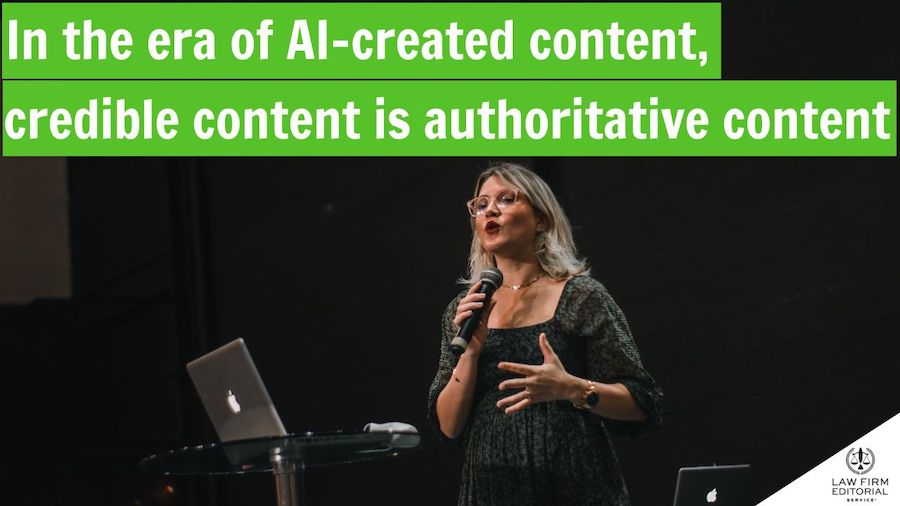With the inevitable influx of new AI-generated content in the legal industry, an author’s credibility will dictate their content’s authoritativeness.
In this emerging era of artificial intelligence and AI-generated content, credible thought leadership content will be authoritative thought leadership content.
It’s becoming easier and easier to create content these days, as you probably are well aware, thanks in large part to AI. As this trend continues, WHO is creating the content is going to be more important than before.
AI tools vs Web searches
When clients have legal issues, regardless of what those issues might be—personal legal issues, legal issues for their employer, or legal issues for the business they own—they’re going to go online to start finding answers to questions they might have about those issues.
With the rise of AI tools like ChatGPT, Bing’s AI tool, and Google’s Bard, these individuals might be more likely to turn to those tools first before a traditional web search.
When they do that, not every AI tool is going to provide them citations and links to the material that is being surfaced by the AI. AI tools (for now, at least) are not always going to spell out the sources of the information they provide a user.
For that reason, people may be hesitant to trust that information because they’re not going to know who created that information or where that information is coming from.
(And, perhaps, they would have been burned before by information they relied on from an AI tool that wasn’t correct.)
Compare that to web searches today (and for the foreseeable future) on Google and other search engines. When you search for information, the search results are presented in a way that gives you an idea of who the author is.
When an author—no matter whether it is an individual or an entity—has credibility in the eyes of a person searching for information, that person will be more likely to click the search result linking to that author’s content because they believe they can trust that author’s content.
Credibility is and will remain the key to the authoritativeness of law firms’ thought leadership content
With law firms and other legal industry participants creating more and more content today, and with more content certain to be created in the future, law firms need to make sure their content is as credible as possible.
They should strive to be the destination for people who have questions about the areas of law that a law firm practices and the industries it serves.
Firms should strive to create content that strikes such a powerful chord with clients and referral sources that they don’t want to go to an AI tool or a search engine first. Instead, they want to go straight to the firm’s website or content channels (like its YouTube page) because they know that the firm is THE credible authority regarding the areas of law it practices based on the content they have consumed before from the firm.
If a law firm’s content is credible and its brand is strong, then prospective clients and referral sources will do this.
But the firm’s content has to be relevant, valuable, and compelling.
It should be educational and not salesy.
It should be easy to digest both in style and in structure.
It should cover a wide swath of issues regarding the firm’s practice areas and industries it serves because the more information the content covers and the broader the scope of the coverage, the more information it will provide, the more readers it will serve, and the more credible the firm will appear.
(Also, the more “sticky” the firm’s website, blog, YouTube page, etc., will be. If a prospective client or referral source can’t find what they’re looking for on a firm’s site or content page, they’ll keep searching elsewhere, including visiting competitors’ sites and content pages. If they do and they find a competitor’s site that is full of insightful information, they might be so persuaded by that content that they decide to hire that competitor because they find that competitor’s content credible and thus authoritative.)
The importance of credible, authoritative legal content is only going to increase
With the influx of AI-generated content by established players in the legal industry and the inevitable influx of new competitors (such as non-lawyer-owned law firms) using AI-generated content to grab market share, law firms need to make sure their thought leadership efforts are above and beyond what their competitors are doing.
The quicker they can become known as a credible source of information regarding the areas of law they practice and the industries they serve in the eyes of their clients and referral sources, the more authoritative they and their information will be perceived to be and the stronger market position they will maintain in the face of a tidal wave of (even more) content and (even more) market entrants.
Thinking about bringing on an outside writer to help your law firm strategize and create compelling thought-leadership marketing and business development content? Click here to schedule a 30-minute Content Strategy Audit to learn if collaborating with an outside writer is the right move for you and your firm.

